MICHAEL A. VENTRELLA: I’m pleased to be interviewing Damon Suede today! Damon Suede grew up out-n-proud deep in the anus of right-wing America, and escaped as soon as it was legal. Having lived all over, he’s earned his crust as a model, a messenger, a promoter, a programmer, a sculptor, a singer, a stripper, a bookkeeper, a bartender, a techie, a teacher, a director… but writing has ever been his bread and butter.  Though new to romance fiction, Damon has been a full-time writer for print, stage, and screen for two decades. He has won some awards, but counts his blessings more often: his amazing friends, his demented family, his beautiful husband, his loyal fans, and his silly, stern, seductive Muse who keeps whispering in his ear, year after year. Get in touch with him at DamonSuede.com.
Though new to romance fiction, Damon has been a full-time writer for print, stage, and screen for two decades. He has won some awards, but counts his blessings more often: his amazing friends, his demented family, his beautiful husband, his loyal fans, and his silly, stern, seductive Muse who keeps whispering in his ear, year after year. Get in touch with him at DamonSuede.com.
Your background was not specifically in writing romance. How did you fall into that?
DAMON SUEDE: Crazy story that. And it happened almost by accident.
I had been making a healthy living in showbiz writing for film/TV/theatre/comics for over 20 years… but was starting to feel a little burnt out and creatively deadened. Corporate entertainment will do that to you.
Back in 2010, a friend who was working on an erotic romance asked if I had time to beat out a plot for her, something I did often for film/TV gigs. I had just finished a big money job and my husband was out of town working a case (he’s a forensic investigator). Well, my friend and I spent about an hour bashing out the plotting gaps and structural messes in her book when she said that if I didn’t write a romance I was and I quote, “the laziest idiot” if I didn’t sit down and write my own novel. She said writing a romance would bring my creative mojo back pronto and claimed the stuff I’d brainstormed off the cuff was fresher and sexier than books she was reading… She bet me I could write a novel in three months; it wound up taking me about six weeks, and I sold the book in two
days, and then it was number one for six months. Blew my mind. But more importantly, it did kickstart my writer brain. And then I was hooked! Suddenly I had all these stories I wanted to tell, and I didn’t have to navigate a path through the Hollywood maze. Sweet
FREEDOM! Delicious.
VENTRELLA: How did you choose this nom de plume? (And do you know Chuck Tingle?)
SUEDE: “Damon Suede” was originally a minor offstage character in a script from years and years ago. I liked the name so much that I decided if I ever became a professional wrestler or shot an erotic thriller it would be my nom de guerre. Well, when I submitted my first novel, I consciously needed a pen name just to keep the work separate from my scripting under my legal name, mainly so I wouldn’t confuse any googling producers. My publisher immediately told me I could never change the pen name and that she could sell thousands of books on the pen name alone, because Damon Suede sounded so much like my narrative voice. 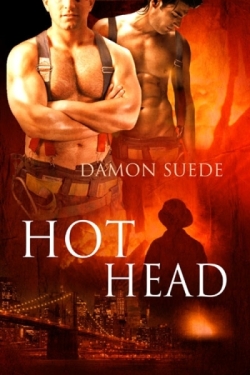 She was right. Having the right pen name gave me a terrific leg up in the early stretch of my career.
She was right. Having the right pen name gave me a terrific leg up in the early stretch of my career.
As for Chuck Tingle… I do. Or at least I know the partners who write as “Chuck Tingle” as an entity. And I think they are legit geniuses. Hilarious, brilliant, and managing to create something almost like performance art within the framework of Amazon. Mad respect for them.
VENTRELLA: Writers are told to “write what you know.” What does this mean to you?
SUEDE: Actually this is some of the best and worst advice ever given to young writers. The truth is I think you should know what you write. By that I mean, don’t write about your backyard and habits. Instead learn to tell stories that make people feel powerful emotions, that change their minds and hearts. Once you learn to do that, if you still feel like unpacking your own personal experiences… mazel tov. But until you develop those basic narrative skills, hone your craft and work your path. Chop wood, carry water.
In modern culture, self-involvement is rampant and other people’s ruts are simply not that interesting. Memoir is mostly boring and most lives are not worth the words wasted in print. Fascinating lives are hard to come by, and the odds against having a fascinating life and the ability to capture it on paper are ASTRONOMICAL.
Instead, write what you feel. Genre fiction is about eliciting a motion from an audience that turns up with certain generic expectations. If you can meet those expectations, exceed those expectations, and produce authentic emotion that changes their real life they will never forget you. Write what you feel and then know what you write.
VENTRELLA: Authors are often told that in order to create great characters, they should figure out the characters’ likes and dislikes and so on. Your opinion is that this is not the way to do it. Care to explain?
SUEDE: Yeah. I call that impersonal ads. For some reason, every young writer gets told to fill out these questionnaires and forms and charts which catalog a big pigpile of random factoids… Sort of free-form mosaic of specifics and trivia intended to fill in the gaps of the character, which somehow magically will make it easy to characterize imaginary people on the page.
It doesn’t.
Mostly it impedes the process because it’s digressive and reductive. 95% of that clutter has nothing to do with the writing process or what ends up on the page and yet most teachers tend to treat that wasted time as acceptable losses.  This makes as much sense as smashing 100 eggs to make an omelette.
This makes as much sense as smashing 100 eggs to make an omelette.
I come to fiction from scripted entertainment. Screenwriters don’t get to cast characters. A horror film you write for Cate Blanchett may end up a web cartoon starring a talking
radish. Scripts can’t rely on cutesy details and personal quirks. Nobody’s going to waste $100 million on a story held together with hair color and opinions. What people want is a story that makes them feel powerful transformative emotions and that requires action… Transformative arcs revealed by high-stakes choices.
VENTRELLA: That makes sense. But surely you fill in those details at some point.
SUEDE: Sure. At the very end… after I know all of the essential elements which bring the character to life. Why would I decide on all cosmetic details before I knew what kind of blood ran through their veins? Thing is, I think people start with characteristics because they feel productive but don’t require much work. It scratches the creative itch but accomplishes very little. It’s a trap… because it feels like you’re making progress, when you’re actually just throwing narrative spaghetti at the wall, most of which gets wasted anyways.
It’s one of those funny things… every young writer gets told to cobble together
interviews and backstory and bios and lists of characteristics: hair color, eye color, race, religion, politics, belief, backstory, family history. This strategy does make a silly kind of ense. Presumably once you know all this stuff you can extrapolate character from it. After all, specificity is always at the root of greatness. Knowing facts seems useful. But how exactly?! That part’s never explained.
All these writing guides urging us to churn out piles of adjectives and categories which have nothing to do with characterization. Bizarre.
The trouble is that characteristics are not character. We know this in our lives, but in fiction we forget. Not all men are manly, not all scientists wear glasses, not all blondes are ditzy or what gentlemen prefer. That kind of nonsense leads to prejudice, stereotypes and worse. You cannot actually write a redhead or a soprano or a Sufi. You can only write a character’s actions, so although the details are essential they are only essential once you are able to pinpoint the actions which drive a story.
Stories based on trivia will be trivial. If characteristics were character we would never
need to meet people before we married them, we could hire people based on their stats,
and every assumption would match reality. Obviously this is nonsense. We learn this
from Aristotle, after all. The only thing that conveys character on the page is action,
because action expresses energy and requires no explanation. It auto-magically
engages and intrigues an audience. Maximum impact, minimum waste.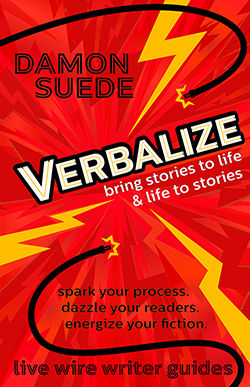
VENTRELLA: Your book VERBALIZE has just been released which builds on this. You’re also doing a workshop. Tell us about that!
SUEDE: The important thing to know is that when I first started writing fiction I thought everyone handled character and story planning the way I did. It just seems so logical.
A few years back I taught a character class with my friends Farrah Rochon and Kristan Higgins and my section of the class covering my oddball verbalization technique went viral. Confused the hell out of me! Because the approach made sense to me, I just assumed it made sense to everyone. Overnight I had people writing to say I’d entirely changed the way they planned and wrote stories. Kristan made it clear that my method was a radical departure for the same-old-same-old, and almost immediately the RWA membership loudly requested a two-hour master class from me the following year which in turn went viral via recordings… in addition to the regional workshops I did for various writing groups.
As I taught my technique, more and more my students began asking me to formalize my methods with the text they could take away complete with exercises and examples and
theory and all the things I want to read when I get stuck.
Well, VERBALIZE came out on 12 March and I’m really freaking proud of it. The NJRWA had already booked me for a weekend workshop last summer but all we knew is that it was on characterization. As soon as they found out the book would come out in advance, they asked if they could tie the two together and make the entire day of verbalization on 14 April, unpacking the techniques I covered in the book. I’m literally thrilled…I cannot wait.
Important to note. The morning will be a lecture with exercises, but the afternoon’s
format springs directly from my day with the Pocono Liars Club in January. Rather than
do manuscript critiques, I offered a verbalization session with the group of writers and
the results blew us away. Based on that success, and the feedback of your members, I
took the idea to NJRWA and they loved the idea of helping people directly on individual
projects in a lab setting. So I have Pocono Liars Club to thank for the hands-on portion
of the afternoon. It’s at least partially your doing, Michael!
VENTRELLA: Hooray! I’m useful!
Which writers do you think are really great at characters? How do they do it?
 VENTRELLA: That’s like asking me to choose from my nearest and dearest! Jane Austen, Charles Dickens, Alexandre Dumas, J.R.R. Tolkien, Georgette Heyer, Madeleine L’Engle, Daphne DuMaurier, Toni Morrison, Damon Runyon, F. Scott Fitzgerald, Isabel Allende, John Le Carré, Roald Dahl, J.K. Rowling, Alice Walker, Robert Graves, Neal Stephenson, Ursula LeGuin, Mary Stewart, Charles Portis, Gore Vidal, Mike Carey…
VENTRELLA: That’s like asking me to choose from my nearest and dearest! Jane Austen, Charles Dickens, Alexandre Dumas, J.R.R. Tolkien, Georgette Heyer, Madeleine L’Engle, Daphne DuMaurier, Toni Morrison, Damon Runyon, F. Scott Fitzgerald, Isabel Allende, John Le Carré, Roald Dahl, J.K. Rowling, Alice Walker, Robert Graves, Neal Stephenson, Ursula LeGuin, Mary Stewart, Charles Portis, Gore Vidal, Mike Carey…
Too many to name. They’re the folks that have gotten me through the darkest moments of my life.
How do they do it? They verbalize their characters. I mean that literally. Every one of the authors named above default to active dramatic, language that brings stories to life because they use the full firepower of potent words. They think eventfully about their stories and their casts, focusing on clear, dramatic, compelling action that wrings emotion out of an audience. They characterize and dramatize by verbalizing.
Once you start noticing the ways you can verbalize a character or story, you see it
everywhere. It’s intrinsic to human narrative, human language. And in fact it’s the way
that most entertainment has been structured since the dawn of structured entertainment. It stands to reason… verbs are the only words which can do anything. Of
course they are the core of storytelling. Especially with scripts because actors need
something to do. Actors act. Without action there is nothing for an audience to want or
watch. Everything always comes down to the verbalization.
VENTRELLA: Having written for other media, do you find that the way you write characters changes based on the medium?
SUEDE: Yes and no.
Fiction and film and stage and comics and video games and musicals and whatnot all operate with a different set of tools and tricks, traps and tripwires. It takes time to learn those each new media and each media bends in certain directions when it comes to things like character, plot, emotion, suspense, etc. much of that is determined by the actual media used for transmission. Film moves so it likes objects in motion. Fiction is solitary and requires internal, subjective processing and decoding so it tends to be more
subjective and psychological. There are overlaps but the various media vary drastically.
By the same token, the rules of characterization and dramatization don’t change. We learn this from Aristotle: character is action. Drama is action. What changes is the way
that action can best through stories in different formats based on fan expectation and
genre format. Again that’s more a function of craft than art, and it’s something that can
only be learned by experience.
VENTRELLA: What’s the best piece of writing advice you ever got?
SUEDE: Write from your joy. Write what you feel so strongly you need to give voice to it. Write the story you need to tell.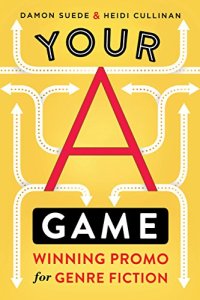
I spent 20+ years writing increasingly commercial projects in film/TV/theatre/comics, and little by little I let the business end of showbiz leach the joy out of my projects. By the time I started writing romance, I’d gotten to the point where every decision I made on the page was weighed against production costs and actors’ egos. I’d get myself so tied in knots that what I’d begun in enthusiasm became drudgery. That sucked. Romance really set me free to write forward. To write my own future. To write from joy every time I sat down. Writing in this genre has been such a blessing in my life because of that infectious energy and buoyancy.
VENTRELLA: How much of writing is innate? In other words, do you believe there are just some people who are born storytellers but simply need to learn technique? Or can anyone become a good writer?
SUEDE: Craft you can learn. Art comes from someplace… else. The two are mutually dependent though and not as easily separated as they might seem. I do think that there are some people with innate verbal gifts that make writing easier for them. There are born storytellers, definitely, but even they benefit from solid technique, because this is after all, a business. Still, anyone can learn the basics of craft and to be honest most bestsellers happen because of exceptional craft more than mindbending art. Craft is easier to control, schedule, to manage and therefore much better for a company’s bottom line. Art is much less predictable and much more erratic. We work at craft, we hope for art, and we take what comes.
I think of this job like masonry. Anyone willing to do hard labor can dig and haul rocks
into from one place to another. Some people might learn to shape the raw stone, organize the blocks, and raise structures which can withstand the weather. And a very few people can conceive and build palaces. All of us start out hauling stones, and with backbreaking labor and insane dedication you may discover you have palaces hiding inside you.
VENTRELLA: Thank you so much for stopping by today, Damon. I think you’ll be seeing several members of the Poconos Liars Club at the NJRWA event in April.
SUEDE: Thank you for having me, man. And thank you to the Liars Club for that weekend back in January. That breakout Character lab we did had such an impact on Verbalize as I was finishing the edits… and to the workshops I’ve done since. I’m sincerely grateful. I look forward to seeing some of y’all in a couple weeks. We’re gonna have a blast!
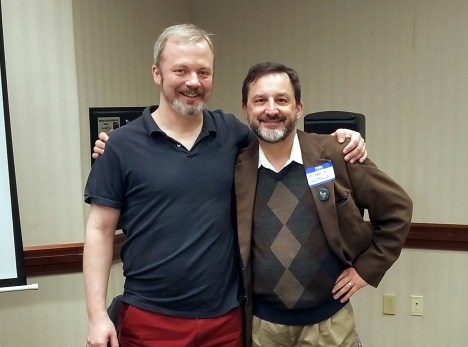
Filed under: writing | Tagged: Damon Suede, romance fiction, romance novels, verbalize |


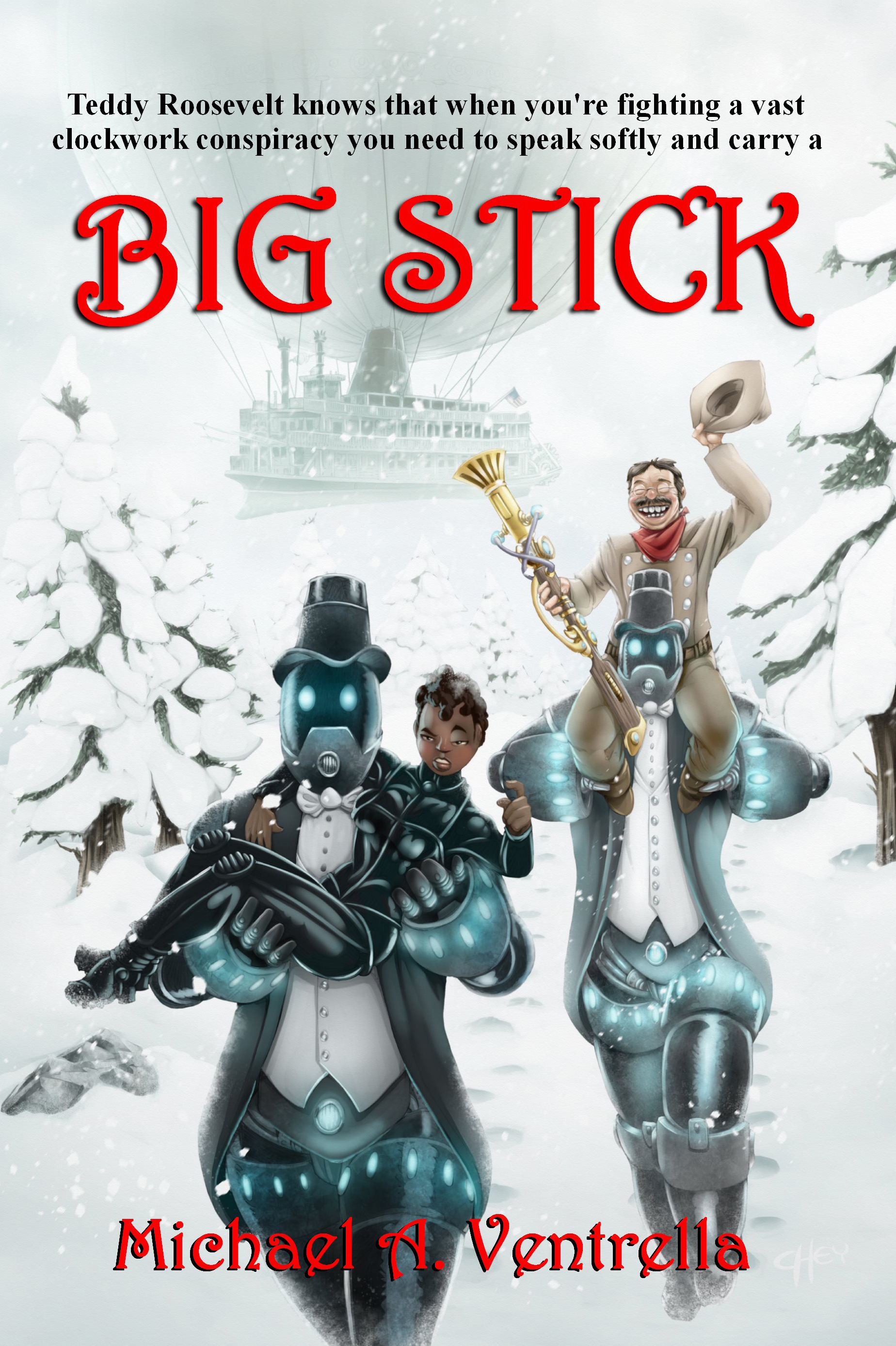
Leave a comment